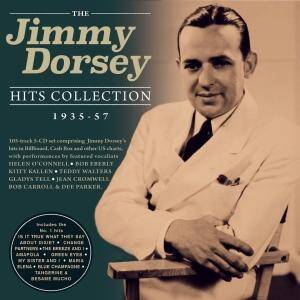 A major jazz clarinetist and alto-saxophonist in the 1920s, Jimmy Dorsey co-led the Dorsey Brothers Orchestra with younger brother Tommy during 1934-35 until a blowup resulted in them splitting up and heading different orchestras.
A major jazz clarinetist and alto-saxophonist in the 1920s, Jimmy Dorsey co-led the Dorsey Brothers Orchestra with younger brother Tommy during 1934-35 until a blowup resulted in them splitting up and heading different orchestras.
While Tommy Dorsey soon found success, it took Jimmy until the early 1940s before his band started really catching on. Ironically, it was not the leader’s playing or the jazz titles but the selections on which Bob Eberly and Helen O’Connell shared the vocals that made the Jimmy Dorsey Orchestra into a commercial success.
While there have been CD and LP collections emphasizing the jazz titles recorded by JD during his big band years, the five-CD Jimmy Dorsey Hits Collection 1935-57 is something much different. The 106 titles, most of which are from 1938-47, are the recordings that made it onto the charts. While some of these selections are still remembered today (particularly the Eberly-O’Connell collaborations), many are long forgotten and have rarely been reissued since they first came out.
Bob Eberly, who was a much stronger singer than his brother Ray Eberle (who worked with Glenn Miller), is the lone vocalist on 52 of the selections, most of which are dance music (other than the leader’s brief solos) rather than hard-swinging jazz. Helen O’Connell, who was just as popular as Eberly and would have a more viable career after leaving Dorsey, is surprisingly the solo singer on just nine songs.
Kay Weber, Ray McKinley, Don Matteson, and June Richmond have one vocal apiece from the early days while Kitty Kallen (who succeeded O’Connell by 1943), Gladys Tell, Teddy Walters, Jean Cromwell, Dee Parker, Bob Carroll, Bill Lawrence, Claire Hogan, and Charlie Teagarden sing on some of the later performances.
There are only ten instrumentals on this set: the rambunctious satire of sweet bands “What’s The Reason I’m Not Pleasin’ You,” “John Silver,” “Perfidia,” “Turn Left,” “Jersey Bounce,” “Sorgum Switch,” “Holiday For Strings,” Dorsey’s 1957 hit “So Rare,” and two other numbers recorded shortly after the altoist’s death (“June Night” and “Jay Dee’s Boogie Woogie”).
From the jazz standpoint, Ray McKinley’s feature on “The Love Bug Will Bite You,” “John Silver,” and three songs from the Dixieland-oriented Original Dorseyland Jazz Band of 1950 (“Johnson Rag,” “Charlie My Boy” and “Rag Mop”) are of greatest interest. Best remembered are the memorable Eberly-O’Connell hits (“Amapola,” “Green Eyes,” and “Tangerine”) and the Eberly-Kallen duets on “Star Eyes” and “Besame Mucho.”
The Jimmy Dorsey Collection is most highly recommended to those who enjoy solid dance music from the swing era and Bob Eberly’s singing.
Jimmy Dorsey Hits Collection 1935-57 (Acrobat ACFCD 7511, 106 selections, TT = 5:20:48) www. mvdb2b.com)
Since 1975 Scott Yanow has been a regular reviewer of albums in many jazz styles. He has written for many jazz and arts magazines, including JazzTimes, Jazziz, Down Beat, Cadence, CODA, and the Los Angeles Jazz Scene, and was the jazz editor for Record Review. He has written an in-depth biography on Dizzy Gillespie for AllMusic.com. He has authored 11 books on jazz, over 900 liner notes for CDs and over 20,000 reviews of jazz recordings.
Yanow was a contributor to and co-editor of the third edition of the All Music Guide to Jazz. He continues to write for Downbeat, Jazziz, the Los Angeles Jazz Scene, the Jazz Rag, the New York City Jazz Record and other publications.






















